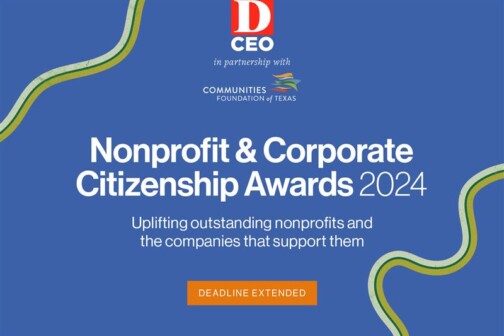Diodes Inc.
KEH-SHEW LU
PRESIDENT AND CEO
Diodes Inc. was feeling some pain in late 2008 and 2009. Like many companies, the Plano developer of semiconductor technology saw some of its short-term investments freeze up amid the broader financial crisis. At one point, its stock price fell to $2.95 per share. But Keh-Shew Lu, the firm’s president and chief executive, wasn’t about to let a business founded in 1959 hit the rocks that easily. Amid a broader cost-cutting effort to keep the company profitable, he shelled out $1 million of his own money to buy Diodes stock. While symbolic, the move helped shore up confidence in the business. Lu also helped secure deals for Diodes to re-purchase some of its corporate debt at discounted prices. Today the company’s stock is trading for about $26 per share, giving it a market value of about $1.25 billion. Lu is a retired Texas Instruments executive who joined Diodes’ board in 2001 and became its CEO in 2005. He has used a combination of organic growth and at least a half-dozen acquisitions to keep Diodes on a diagonal line upward. The company’s products can be found in everything from consumer electronics, computing technology, and communications systems to industrial and automotive applications. Diodes has more than 30 locations worldwide and 6,000 employees. Since the early ’90s, its product suite has grown from just over 100 to closer to 7,500. Since March 1992, Diodes’ stock has produced a return of more than 8,800 percent, according to Yahoo Finance. —J.B.
ECi Software Solutions
RON BOOKS
PRESIDENT AND CEO
No matter the line of business you’re in, a basic precept holds that bigger customers are better. More revenue from the sale, more profit, more prestige. Since 1998, ECi Software Solutions has made a nice living turning that conventional wisdom on its head. The Fort Worth business sells a range of software products that automate labor-intensive and costly chores that companies have to do to stay in business, but that aren’t central to what they do to make money. ECi’s secret sauce is providing its software to small and midsized companies, primarily in high-volume, low-margin areas like lumber yards and office equipment dealers with $50 million or less in revenue. The technology that ECi provides, called enterprise resource planning software, or ERP for short, has been in the Fortune 2000 for decades. The result is that the market for the big boys is largely saturated, leaving big ERP vendors like Oracle and SAP largely stealing each other’s customers. Ron Books, who has been ECi’s president and CEO for eight years of his 10-year career at the company, says the business is targeting “an untapped market.” The big vendors are trying to sell to smaller customers, he notes. But “they’re not coming down market successfully.” ECi seems to be managing the segment just fine. Revenue grew from roughly $100 million in 2012 to nearly $110 million last year, and should clock in at $123 million in 2014. The private equity world seems to like what ECi is doing. The Carlyle Group, a prestigious Washington, D.C., investment house, acquired a controlling stake in ECi in March from Insight Venture Partners on undisclosed terms. —J.B.
Greatbatch Inc.
THOMAS HOOK
PRESIDENT AND CEO
Like most businesses, Greatbatch Inc. had to decide how it was going to handle the financial crisis engulfing the United States in 2007 and 2008. While most companies opted for across-the-board spending cuts, Greatbatch took a different tack. The medical device maker opted to increase spending on research, development, and engineering. From 2008 to 2011, Greatbatch’s annual spending in those areas grew from $34.4 million to $45.5 million. In 2013, it spent a little more than $54 million on R&D. “We had to decide whether to sacrifice the crown jewels of innovation or double down and come out of the recovery stronger,” says Thomas J. Hook, president and chief executive. “After a lot of deliberations, we increased R&D spending dramatically.” After five-plus years of work, the fruits of that Great Recession-era spending are on the cusp of being ready for harvest. First up is Algostim, a neurostimulation device that is implanted in the back to relieve chronic pain in patients for whom medication and other approaches don’t work. Having started work on that project in 2008, Frisco-based Greatbatch has submitted Algostim to the Food and Drug Administration for approval, and is in the process of rolling out the device in Europe for clinical purposes. Next year, Algostim will begin rolling out in the United States. In addition, Hook has three other device platforms in development that he’s not ready to talk about. Algostim and its other in-development cousins are part of Hook’s efforts to diversify the business’ revenue base beyond making batteries for pacemakers, which has been at the core of the company for the last 40-odd years. Something must be going right. Since 2008, Greatbatch’s annual revenue has climbed from $546.6 million to nearly $664 million. —J.B.
Matador Resources
JOSEPH FORAN
CHAIRMAN AND CEO
Growing up in Midland, Texas, Joseph Foran was exposed to the oil industry at an early age. “My father was in pipeline construction, and I always thought the people that worked in that business were good, honorable people,” he says. He started his own career as an independent oil and gas producer in 1983 when he and his wife, Nancy, founded Foran Oil Co. It merged into Matador Petroleum Corp. in 1988. Foran served as chairman, CEO, and president of Matador Petroleum until the company was sold to Tom Brown Inc. In July 2003, Foran, who believed the future of the industry was in unconventional resource plays, founded Matador Resources to capitalize on that opportunity. The company does exploration, development, production, and acquisition of oil and natural gas resources in the United States. Operations are focused primarily on the Eagle Ford shale play in South Texas and the Wolfcamp and Bone Spring plays in the Permian Basin in southeast New Mexico and West Texas. In 2009, Matador Resources reported $19 million in revenue. It increased to $269 million in 2013 and is projected to be about $400 million in 2014. Matador focuses on “drilling better wells for less money,” Foran says. As stockholders, employees have a vested interest in finding ways to accomplish that goal. —G.V.
Masergy Communications Inc.
CHRIS MACFARLAND
CEO
When Masergy hired Chris MacFarland for a 30-day consulting gig, the company had no chief executive, the management team was in transition, and its venture capital partners were seeking liquidity. But serial entrepreneur MacFarland, who had recently sold a business and was considering a new startup, could see the potential. “What I found was the foundation was laid here with technology that was very innovative and disruptive to the marketplace and there was a strong drive to provide satisfaction,” he says. “If we could approach the marketplace and scale up some of the systems and processes, it could be a pretty great business.” He joined as COO and was named chief executive in 2010. Plano-based Masergy, which owns and operates one of the largest independent cloud networking platforms in the world, is focused on medium to large enterprises. MacFarland calls them one of the more challenging areas in which to succeeed, because of the complexity of the geographic and infrastructure environments. In 2008, revenue was just shy of $90 million and “not very profitable,” MacFarland says. That compared to a projected $200 million for fiscal year 2014. Masergy anticipates continued global expansion into approximately six cities annually, with 15 percent to 20 percent year-over-year growth. “We’ve got a business that is best in class of technology and services, and I couldn’t be more proud in terms of the team that works with me and their commitment to customers and the community,” he says. —K.N






